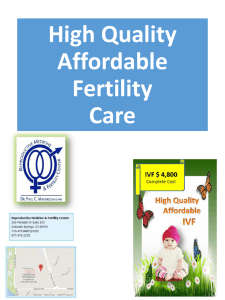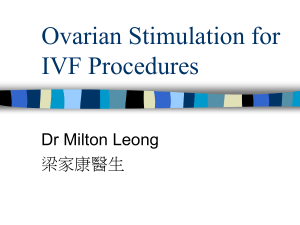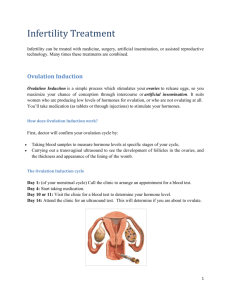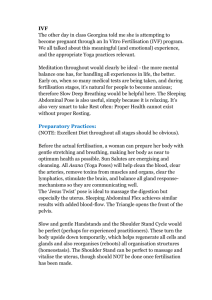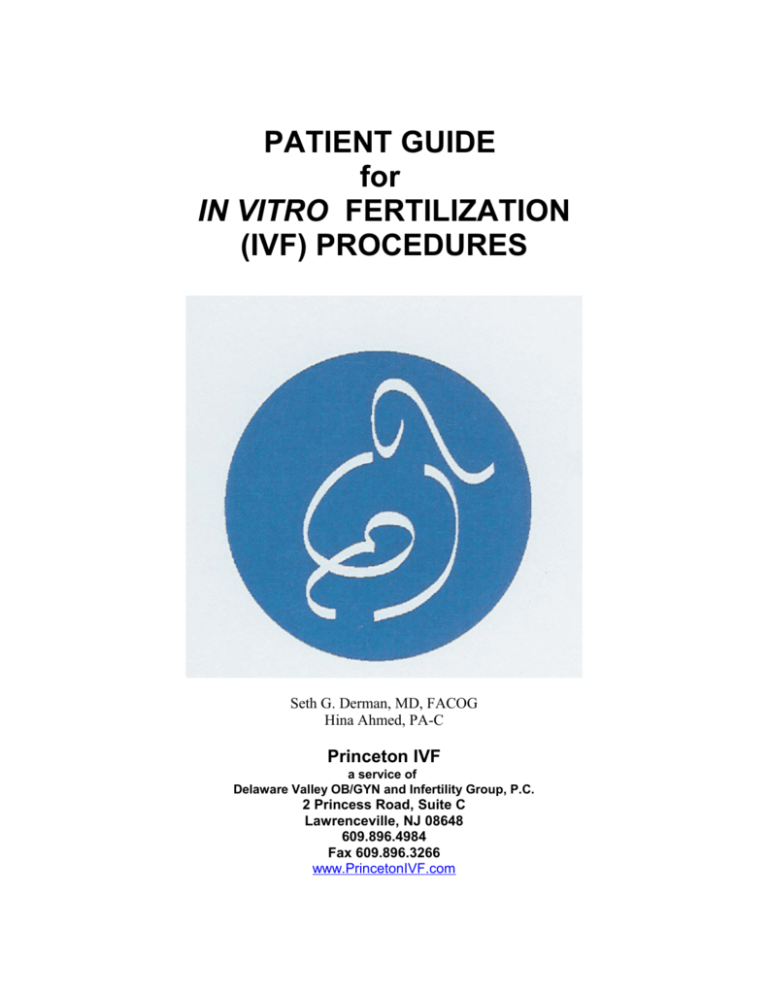
PATIENT GUIDE
for
IN VITRO FERTILIZATION
(IVF) PROCEDURES
Seth G. Derman, MD, FACOG
Hina Ahmed, PA-C
Princeton IVF
a service of
Delaware Valley OB/GYN and Infertility Group, P.C.
2 Princess Road, Suite C
Lawrenceville, NJ 08648
609.896.4984
Fax 609.896.3266
www.PrincetonIVF.com
What is In Vitro Fertilization?
In vitro fertilization refers to a procedure in which your eggs are
removed and fertilized (usually with your husband’s sperm)
outside the body, in a laboratory dish, and then several days later
the embryos are transferred back into your womb. The IVF
procedure is, in fact, much more involved than that and involves a series of steps that
lead up to the actual laboratory portion of the procedure. This booklet will describe
those steps in detail, what is expected of you during each stage and discuss the risks
and benefits of the IVF procedure. It is important that you read this manual thoroughly,
and bring up any concerns with your doctor at the earliest possible opportunity.
Is IVF an experimental procedure?
No, IVF has been around for a number of years. The first child conceived by IVF is in
her late twenties, and since than time the procedure has improved to the point that its
success rates (per cycle) are higher than of natural conception. Tens of thousands of
babies have been born as the result of IVF cycles. It is possible, though not certain that
IVF, and particularly ICSI (where the sperm is injected directly into the egg) may be
associated with a higher risk of birth defects. This is a very gray area in the medical
literature. If a risk does it exist, it is relatively small.
Reasons for Doing IVF
Damaged, ligated or missing fallopian tubes
Endometriosis
Unexplained infertility
No success with injectable drugs/IUI
Poor sperm quality
Antibodies to sperm
2
Reaching the doctor and clinical staff
In order to have your questions answered during regular business hours, please call us
at 609-896-4984. Routine clinical (not financial or insurance related) questions can be
directed to our nursing line (option 3). Messages left on our voice mail before 2 PM on
regular business days will be returned as soon as possible on that date. If you have
call blocking, we may not be able to reach you. If you have an issue which is urgent
and cannot wait, enter 5 and a member of our staff will locate the doctor. All insurance/
financial/ precertification issues should be addressed to Melissa in our business office
(option 2). If you have questions about your embryos or storage issues, you will need to
speak with Nick, the embryologist.
At night or on weekends, call Delaware Valley’s main number 609-896-0777, and the
answering service will put you through to the person on-call for infertility (either Dr.
Derman or Hina Ahmed, Physician Assistant.) Please let them know that you are a
patient of Princeton IVF, and that it is IVF related.
Our Laboratory
We pleased to be the first practice to offer in house IVF laboratory services in Mercer
County. While our lab may be new, and the equipment state-of-the art, we are not new
to IVF.
Our embryologists, Nick Yun and Brian Leonard are well reversed in IVF procedures.
Our Embryology Laboratory is under the direction of Eduardo Kelly, MD, who has run
some of the most successful IVF labs in California, Boston, and New Jersey.
3
Pre-IVF Checklist
The following items must be completed prior to starting an IVF cycle:
(instruction sheets for the first four items are available in the office or online)
(1) Sonohysterogram (SHG) must be performed at some point to check the lining of the uterus,
and to give us a chance to figure out how best to replace your embryos. The procedure is done M-F
in the early mornings. A trial (practice) transfer and cervical cultures will done be at the the time of
your SHG. Please contact Raquel to find out if you need a authorization or referral for your
insurance prior to this procedure.
(2) Day 3 FSH/LH/E2 level- this blood test is drawn on the third day of bleeding or the next closest
weekday in order to determine if you are a candidate for IVF and how best to stimulate your ovaries.
It measures the “aging” of your ovaries. A good level is below 10. In some cases, we may do a
clomid challenge test instead.
(3)Semen analysis- this is done after 3-7 days of abstention, and run in our office. Raquel can help
set up the appointment. This is important to determine whether we can do standard IVF or require
ICSI. You must contact Raquel to set up this appointment.
(4) Endometrial Biopsy- this is done within the week prior to the start of your fertility medications.
In some patients, this may improve the effectiveness of IVF.
(5) Injection Teaching- this appointment will be scheduled within the week prior to the start of your
fertility medications. Hina Ahmed, our physician assistant, will sit down with you to go over every
medication individually and teach you how to administer these medications. You may wish to bring
your partner to this visit if they are planning to help you with the injections. Please bring in your
box of medications to this appointment. It is our hope that this appointment will alleviate any
anxiety you may have in regards to the medication and will also assure us that you or your partner
understand how to administer the medications. A date for this appointment will be given to you.
(6)You and your partner must have screening bloodwork for sexually transmitted diseases. You
will also need a blood count and blood type.
(7) Review and sign the IVF consent form and the cryopreservation (freezing) consent form.
We recommend embryo freezing whenever possible. Please make sure your partner signs where
indicated, and that all pages are initialed. We must have this form by the day you start
medications! The forms are available on the web site, but you must know the exact URL to get
them. We can provide this for you.
(8) Consultation with Dr. Fallick - required only if the male partner has no sperm and TESA or
MESA is required. He is a subspecialist urologist who will perform sperm aspiration procedures in
his office in Voorhees. In some instances, the sample can be frozen and saved for the upcoming
egg retrieval.
(9) Financial clearance- you must be cleared by Raquel at our business office before fertility
injections can begin. It is your responsibility to make sure this happens. We cannot allow Follistim or
any fertility drugs to begin until this are done.
(10) Special arrangements- If you are using donor sperm, Microsort sperm selection,
preimplantation genetic testing or any non-standard procedures, all arrangement must be made well
in advance.
4
The Steps involved in the IVF procedure:
(1) Shutting down the ovaries with birth control pills
(2) Stimulating the ovaries with fertility drugs
(3) Harvesting the eggs
(4) Fertilization in the laboratory
(5) Embryo transfer
(6) Support of the luteal phase
(7) The pregnancy test
Here is a description of each step:
1.
Shutting the Ovary Down with Birth Control Pills
Birth control pills are started during the first week of the cycle before
we do the IVF. This helps to balance out your hormone levels,
improve the quality of your eggs and minimize the hot flashes if you
are on lupron. You will take the pill, daily at the same time, and
continuously. That means no placebo/blank pills and no skipped
pills until you are instructed to stop. If you run out, you will start a new pack. In
order to avoid confusion, you may wish to discard the placebo pills. Some women will
experience nausea, bloating or irregular bleeding on the pills. If this happens, do not be
concerned.
When you start the pills, be sure the doctor knows, so that we may give you a date to
stop the pill. If you start your period and the pills over the weekend, you may wait until
Monday morning to call us. The pill stop date will be after about 3-6 weeks, and is
almost always on a Sunday. If you stop the pills too early or too late or take placebo
pills instead, we may not be able to start your cycle when planned.
You will schedule and an appointment for ultrasound and bloodwork, on the Friday after
you stop the pills. You will start your injectable medications on SATURDAY. We call
this “Day 3” though it may not really be the third day of your period. Your period most
likely will begin a day or two before “day 3,” but do not be concerned if it has not begun.
Occasionally our patients with undergo a stimulation protocol that involves the use of
Lupron or leuprolide, an injection that starts on day 20 of the cycle before the actual IVF
cycle. Lupron is a GnRH antagonist, which initially stimulates and then suppresses the
ovary. Along with the birth control, the Lupron will synchronize the egg development,
and then later on, prevent premature ovulation. It can cause headaches and hot
flashes. If you have been instructed to be on this protocol, you will come in by day 20
for injection teaching in order to start the medication. You will be given a Sunday to
stop the pills and a Tuesday drop your Lupron dose to 5 units, you will come in for
blood work and ultrasound that Friday and that Saturday will be your “Day 3.”
Still other patients will undergo a lupron flare protocol in which lupron is started the day
before the fertility drugs.
5
2.
Stimulation of the Ovaries with Injectable Fertility Drugs
Human Menopausal Gonadotropins (hMG, Repronex, Menopur) and Follicle
Stimulating Hormone (FSH, Follistim, Gonal-F, Bravelle): Repronex and Menopur are
fertility drugs which contain equal amounts of FSH and LH and are extracted from the
urine of postmenopausal women. FSH and LH are hormones that will stimulate
multiple eggs in a given cycle, when given in higher than natural doses. Follistim and
Gonal-F contains only FSH (synthesized in a laboratory), and are given by a specifically
design pen that is similar to an insulin or epi pen. Bravelle also contains FSH
(extracted from urine) is given by a small subcutaneous needle after reconstitution.
The FSH-only drugs are generally given at night so we may adjust the dose as needed.
In the morning you will use Repronex or Menopur, which you will need to reconstitute
each day before injecting. In patients who respond poorly to the medications, the shots
may be given by intramuscular injection.
At a predetermined point after stopping birth control pills you will be brought in for an
ultrasound and blood work and will be started on the fertility medications. The start
day is called “DAY 3” and may or may not coincide with the third day of your period.
Most likely your fertility drugs will start on a Saturday. We will give you instructions on
the timing and dosage of your injections. You should not start your fertility medications
unless you have had blood work and ultrasound the day prior (Friday). During the
stimulation, you will have ultrasounds and blood work 2-4 times a week until the follicles
have reached a mature size, usually when the largest 2 are 17 mm in diameter.
Maturation of the eggs typically takes 7-10 days.
IVF Timings for blood work and ultrasounds:
blood work
Monday
Tuesday
Wednesday
Thursday
Friday
6-9AM
6-19AM
6-9AM
6-9AM
6-9AM
ultrasounds
6:45- 9AM
6:45- 9AM
6:45- 9AM
6:45- 9AM
6:45-9AM
In most instances, your blood work will be drawn first before preceding to the
ultrasound. Please plan for spending one hour in our office for us to complete the
blood draw and ultrasound process. Saturday visits are by appointment only, and
usually at 7 AM.
Most patients receive their fertility injections twice a day. They may be subcutaneous (a
small 25-30g needle or pen just under the skin) or intramuscular (a larger 22G needle in
the buttocks). The doctor will make a determination on what will be the best mixture for
you. The medications may include a mixture of Follistim, Gonal-F, Repronex, Bravelle
and Menopur.
The major side effects include risk of ovarian hyperstimulation and multiple
pregnancies. Although these preparations are considered generally safe, the longterm effects, if any (including concerns about the risk of ovarian cancer), from their use
are currently unknown. Headaches and mood swings may occur as well.
6
Ovarian Hyperstimulation is one of the major, potential complications of treatment with
injectable fertility drugs. Mild to moderate hyperstimulation is quite common and
consists of a mild to moderate degree of ovarian enlargement and abdominal
discomfort, and usually resolves on its own. Limited activity and Tylenol are normally
all that are needed to alleviate symptoms. Severe ovarian hyperstimulation syndrome
is far less common but is potentially life threatening. Severe ovarian hyperstimulation
syndrome involves massive ovarian enlargement due to multiple ovarian cysts,
accumulation of fluid in the belly and chest cavities and rarely blood clots
(thromboembolism). This disorder is most common in women with polycystic ovaries,
and those who produce more than 20 eggs or have very high estradiol levels. The
best treatment is prevention. The disorder rarely becomes severe unless a cycle results
in pregnancy. Ways of minimizing this problem from occurring include decreasing the
doses of medications, taking Metformin, give intravenous albumin infusions, withholding
hCG and canceling the cycle, and retrieving the eggs but freezing the eggs for transfer
at a later time.
Signs that should alert you to the development of this syndrome include abdominal
distention (bloating), rapid weight gain of more than 2 pounds in one day and difficulty
taking a deep breath. When diagnosed, hospitalization may be indicated. In some
patients, aspiration of the fluid with a needle may be helpful.
Multiple pregnancies occur in over 1/4 of IVF pregnancies and are mostly twins or
triplets. If you have triplet or especially quadruplets or more, you should seriously
consider a fetal reduction procedure to bring the number down to 2. As this may be a
difficult moral dilemma for many couples, you should discuss this possibility with your
partner in advance.
Unless you are on Lupron, on the Tuesday after you begin your fertility injections, you
will start a third daily injection. Ganirelix is subcutaneous, comes in a premixed syringe
and is taken each morning from the time you are instructed until the hCG shot
(described below). It is a GnRH antagonist and is there to prevent your eggs from
releasing prematurely. Side effects such as headaches are uncommon. If you do
ovulate prematurely, your cycle will most likely be cancelled.
3.
Harvesting the Eggs
When the eggs are of mature size, usually 17mm, you will receive instructions on when
to take your hCG shot (Novarel, Pregnyl, Chorionic Gonadotropin). The box contains
a vial of water and a vial of powder that says 10,000 IU. It is mixed as follows, draw up
3 cc of saline into the 22G needle/syringe and add it to the hCG powder, mix and inject
intramuscularly in the buttocks. This injection must be given exactly at the time you
were told to take it. If you are more than 15 minutes off, you must let the doctor know
first thing in the morning. On the day of hCG, you will also begin a short 6-day course
of antibiotics (doxycycline) and steroids (Medrol).
Egg retrieval is performed transvaginally with ultrasound guidance under conscious
sedation, and takes approximately 15 minutes. Dr. Derman will perform the procedure
in our office. An ultrasound is performed at which time a needle is inserted into each
7
follicle and the egg and follicular fluid is aspirated. You will receive deep sedation given
by an anesthesiologist. The anesthetic agents should be shipped to us in advance. If
you have Aetna, we will order the medications ourselves. You will also bring in a vial of
antibiotic (Doxycycline). If you have mitral valve prolapse and require special
antibiotics, or have an allergy to Doxycycline, please let us know in advance.
The risks of transvaginal aspiration of follicles include infection, bleeding and damage
to the adjacent organs. Occasionally hospitalization, transfusion, intravenous
antibiotics and/or surgery are required. Though exceedingly rare, deaths have been
reported following the procedure.
4.
Fertilization in the Laboratory
After the retrieval, the eggs are immediately handed over to our embryology lab. Your
will provide a fresh semen sample shortly after you arrive at the office. and our staff will
prepare the sperm. (If you are using donor sperm or microsort, you must arrange for
the sperm to arrive at our office at least a week before retrieval) The eggs and sperm
are placed together overnight and we will find out if the eggs have fertilized the
following day. If you are having ICSI, the sperm are injected directly into the egg, but
even then, fertilization is not always assured. Our laboratory staff will call to inform you
about fertilization the day after retrieval.
Intra-Cytoplasmic Sperm Injection (ICSI) is a laboratory procedure in
which a single sperm is inserted directly into the cytoplasm of an egg
cell. This is done in cases of very poor sperm quality or failed
fertilization in the past, or if the number of eggs is very small. It is
performed on the day of retrieval. This is usually necessary in cases of sperm
abnormalities. Some studies have suggested a slightly higher instance of abnormal sex
chromosomes in infants conceived by ICSI while other studies have shown no risk to
ICSI. In the case of a male child, this may cause your husband to pass on a gene that
may cause his male offspring to be infertile.
PICSI is a sperm selection method for patients with highly fragmented sperm DNA who
have failed previous IVF cycles. PICSI is used in conjunction with ICSI. This method
will help to select a mature healthy sperm for injection.
Assisted hatching is a laboratory procedure in which an acid solution
or laser is used to drill a hole in the zona pellucida, a protective
coating around the egg. Women who are over 38, have embryos with
thick zonas or have failed IVF in the past may benefit from this
procedure.
If you have excess fertilized eggs, you have the option of embryo
cryopreservation (freezing and storage). The extra embryos will be
frozen and then stored for transfer at a later time, without having to
undergo stimulation with the fertility drugs. Choosing to participate in the
freezing program will give you extra chances at IVF, at a lower cost,
with less monitoring and with fewer medications. If you wish to
8
participate in the cryopreservation program, you must tell us in advance, and sign the
cryopreservation consent forms. The forms contain places where you indicate what you
want done with your embryos should we be unable to find you in the future.
Embryo cryopreservation, assisted hatching, ICSI and PICSI incur extra charges which
may or may not be covered by your insurance. If not, any charges may be required up
front, before you start your fertility drugs.
During this time there are a number of events that may prevent you from reaching the
next stage. The eggs may fail to fertilize or those that do fertilize may not divide
properly or look grossly abnormal. A culture dish where the embryos are kept may
become contaminated making the embryo(s) not suitable for transfer. Additionally,
power outages, acts of g-d and other unforeseen events may occur.
5.
Embryo Transfer
This procedure is usually performed three (or occasionally five) days after the egg
retrieval and without the use of anesthesia. An abdominal ultrasound is used, so you
will need to have a full bladder. You should drink one liter of water on the way in.
Women who are younger or who have a large number of fertilized eggs may undergo a
blastocyst transfer in which embryos are transferred at a later stage on day 5. This will
minimize the risk of high order multiple pregnancies. The procedure is brief and lasts
only a few minutes. A soft plastic catheter is introduced into the uterus through the
cervix and the embryos injected, while we watch on the ultrasound. Rarely, it may
impossible to pass the catheter. Side effects of the procedure include mild cramping
and minimal bleeding. After a brief period of recovery you will be discharged and kept
at home on bedrest for the next 24 hours.
6.
Support of the Luteal Phase
The last part of the menstrual cycle is called the luteal phase, and during this time,
large amounts of a hormone called progesterone is secreted to help maintain the early
pregnancy. Since we will be removing some of the hormone producing cells, it will be
necessary to replace it with medication.
Most patients will receive vaginal suppositories of progesterone. These suppositories
will be taken three times a day which usually start 1day after the retrieval. The nurse
will review with you how to take these suppositories on the day of your retrieval before
you go home. You progesterone hormone level will be checked about 5 days after
embryo transfer.
Some patients may need to start supplementation with progesterone in oil injections.
The doctor will let you know if this is the case after reviewing your progesterone level
results. Progesterone in oil injections require a 3cc syringe with a large 18G needle.
The needle is used to draw up 1 cc of the medication. Warming up the oil may help in
drawing the medicine up. You will then change to the 22G needle and inject high in the
buttocks.
9
You will also be on Estrace (estradiol) 2 mg orally daily beginning the day after retrieval.
The progesterone shots and/or suppositories start the day after the egg retrieval and
continue until the doctor clears you to switch to progesterone pills or you have a
negative pregnancy test. Progesterone levels will be drawn several times to make sure
the dosing is correct.
Do not stop progesterone until you are instructed to do so by the doctor. Vaginal
bleeding does not always mean the procedure has failed and may occur from vaginal
suppositiories.
7.
The Pregnancy Test
You will have a progesterone level drawn 4-5 days after the transfer. Then two
pregnancy tests will be done, on approximately days 10 and 12 after the embryo
transfer. Most of the time, results will be ready the same day. You will not be given
the results until the second beta (pregnancy test) is back. That way we can give
you an accurate assessment on what is going on. Once positive, it is essential we
follow you closely will biweekly hCG and progesterone levels and ultrasounds as
needed. As with all pregnancies, the risk of miscarriage and even ectopic (tubal)
pregnancy exists with IVF pregnancies.
Cycle Cancellation
In some cases IVF cycles need to be canceled, and it is very important that you
understand this. The following are some of the reasons:
-you do not respond adequately to the medication
-you over respond to the medication and the physician decides that it is too risky to your
health to allow the cycle to proceed. In such a case, you may be given the option to go
to retrieval and freeze vs. withholding the hCG shot.
-the LH or progesterone hormone levels rise prematurely indicating that the eggs are
likely to release prematurely
-you do not take the hCG when instructed to do so
-egg retrieval procedure yields no eggs
-the eggs do not fertilize
-the fertilized eggs do not divide or look grossly abnormal
After cancellation, we can discuss if any additional testing is needed and make plans
for a new IVF start if that is appropriate.
10
IVF and Stress
Infertility and its treatment are among the most serious sources of psychological stress
you and your partner are likely to endure. It is important that the two of you are both
strongly committed to doing IVF and are supportive of each other. If not, you may wish
to consider counseling before beginning the cycle. Reducing your stress levels will
improve your chances for success. We have a counselor to whom we can refer you
if you need. Some of our patients find acupuncture to be helpful, and we can assist you
with that as well.
Other sources for support include Resolve (a national network of infertility patients with
a local chapter), books and internet chat sites.
Special Types of IVF
PGD
Patients who are carriers for know genetic diseases or have a history of
recurrent miscarriages due chromosome abnormalities, may be
candidates for preimplantation genetic diagnosis (PGD). On the day
of the planned embryo transfer (see below), one of the eight identical
cells that make up each embryo is removed and sent off for genetic
testing. The lab can test for large chromosomal abnormalities such as
Down Syndrome by a technique called FISH or single gene abnormalities such as cystic
fibrosis using PCR. Two days later embryos are that are known to be normal after
testing are transferred at the blastocyst stage. This procedure is expensive, usually not
covered by insurance, may lower pregnancy rates and occasionally misses the
abnormalities it is testing for. For PGD cases, we work in conjunction with
Reprogenetics in Livingston, NJ whose scientists will perform the embryo biopsy and
testing on the embryos. This procedure always requires advanced planning.
Reprogenetics phone number is 973-436-5017.
Microsort ®
Currently this option is no longer available.
Many couples ask us about sex selection in order to improve your chances of having a
boy or girl. If you are interested in such a procedure, we can make arrangements for
sperm sorting procedure (Microsort), which is performed in Fairfax, VA. The sample is
collected and then sorted for male or female sperm at their facility in Virginia. The
procedure is done well in advance, frozen and shipped to our lab. In such cases, ICSI
is always required. Please keep in mind that it is fairly expensive, not always effective
and not yet FDA approved. The success rates for choosing the sex (not pregnancy
rates) is 91 % for girls and 76% for boys. Plans for this must be made well in advance.
Frozen Embryo Transfer
As discussed above, we strongly encourage couples doing IVF to freeze any extra
embryos. This will enable you to have extra chances for having a baby, with much less
11
hassle and cost than normally is associated with IVF. We use a mixture of hormones to
simulate a natural unstimulated cycle.
The frozen embryo cycle works as follows: You will start a medication called Lupron
(leuprolide) on day 20 of your cycle. Lupron is a GnRH antagonist, which suppresses
the ovary and throws you into a temporary menopause. It can cause headaches and
hot flashes. We will teach you how to do the injections at that time. The dose will start
at 10 units daily (0.1 cc). When your period comes, the dose will drop to 5 units (0.05
cc) and you will schedule an ultrasound and blood work at the tail end of your period,
during our morning hours. Please make sure you have filled out and returned to us the
frozen embryo transfer consent pack (two pages) as soon as possible.
At that time, if your endometrium (the uterine lining) is thin enough and your estradiol
level is low enough, will be begin a protocol of increasing doses of estradiol pills and
eventually vaginal progesterone suppositories, and given a tentative date for transfer.
You be instructed when to come in for one additional ultrasound, and if the
endometrium is adequately thick at this time, your transfer date will be finalized.
When you show up for the transfer in our office, you may eat but please avoid caffeine
and have a full bladder. You should drink a liter of water of water on the way in. The
transfer is done under ultrasound guidance and is generally painless. You will be given
a schedule for blood work as described above for “regular” IVF.
Donor Egg
Women who have failed multiple IVF cycles, have high FSH levels or are too old to be
candidates for IVF, are usually advised to consider Donor Egg IVF. While a child born
following such a procedure will not have any of your genes, the chances for having a
child with this technique are extremely high, and minimally age dependent.
The first stage for egg donation is finding a suitable donor. You may have a friend or
relative in mind, or we may put you in touch with an egg broker who can find a match
for you. Using an anonymous donor can be very expensive, but the chances for
personal and family conflicts are much lower, and the pregnancy rates are higher.
We work with the following egg brokerage agencies:
1. S.E.E.D.S
570-689-5755
www.seedscenter.com
2. Concieveabilabilities
877-201-7211
www.conceiveabilities.com
3. Tiny Treasures
781-279-1325
www.tinytreasuresagency.com
The donor is screened for genetic and sexually transmitted diseases, and counseled
about the procedure she is about to go through. She then goes through the procedures
described in steps 1, 2 and 3 above. Her eggs are then fertilized with your partner's
sperm as described in step 4, and the embryos are transferred to your uterus as
described in step 5.
Your uterus will be prepared with Lupron, and then estradiol and progesterone shots
similar to what is described under the frozen embryo transfer section above. The
12
Lupron is started and dropped early on, so that you are ready to start the estradiol pills
when your donor starts her fertility drugs.
Good luck
You and your partner are about to embark on an exciting, yet strenuous adventure.
While you may at times feel overwhelmed, you should realize that you have an
opportunity not available to earlier generations of women. Remember to set your sights
on the goal at hand, but still try to be realistic about your chances.
All rights reserved, Seth G. Derman, MD, 1996-2008
13


